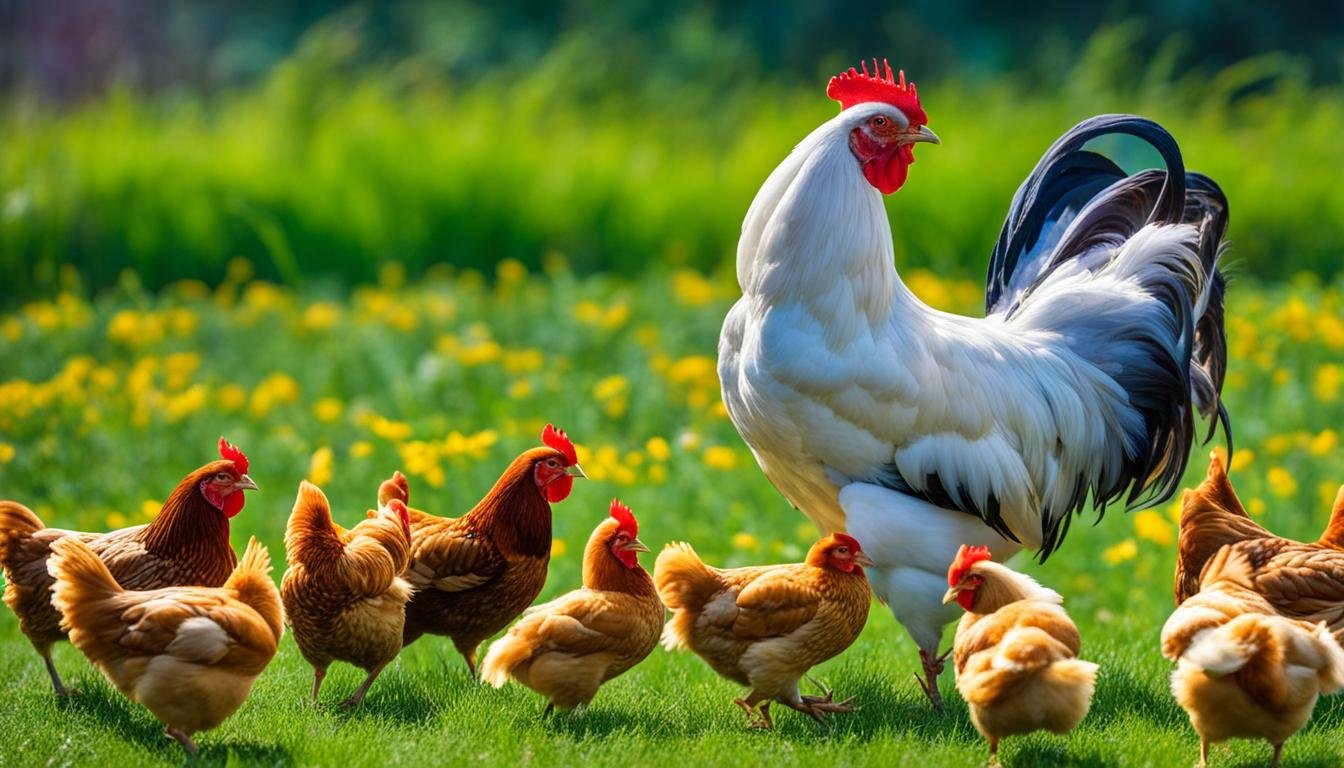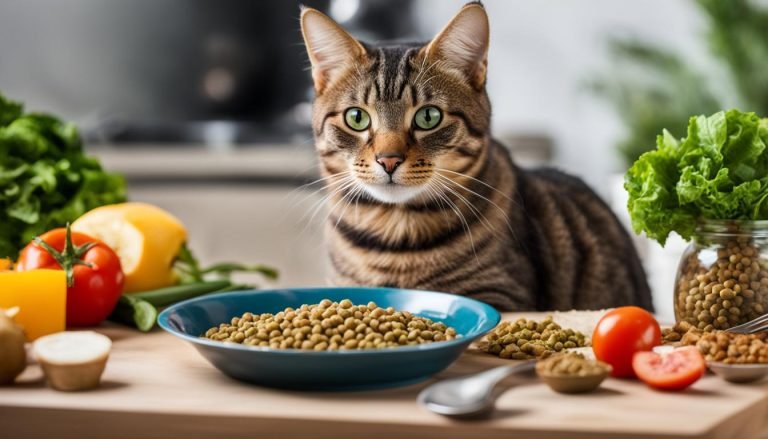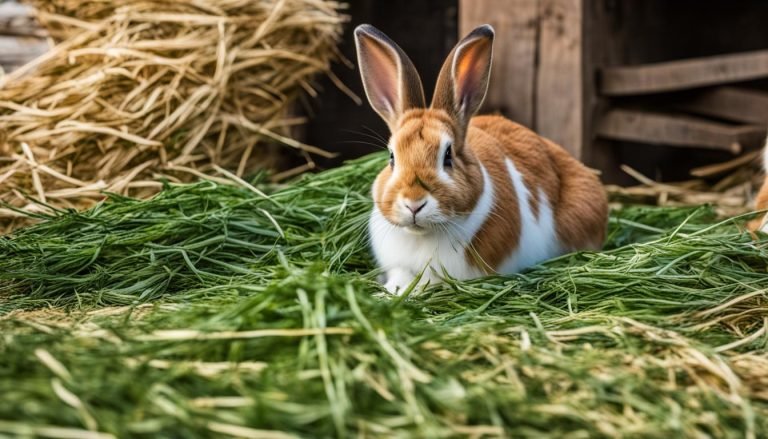Feathered Friends: What Do Chickens Eat?
As a chicken keeper, you want to ensure your feathered friends receive a balanced and nutritious diet.
With so many options available, it can be challenging to determine what to feed them. But don’t worry, I’ve got you covered!
In this article, we’ll explore the dietary needs of chickens and discuss the best food options for maintaining their optimal health.
Whether you’re a backyard chicken keeper or a commercial farmer, understanding what to feed your chickens is crucial for their overall well-being.
Chicken Quiz
How well do you know chickens? Test your knowledge below!

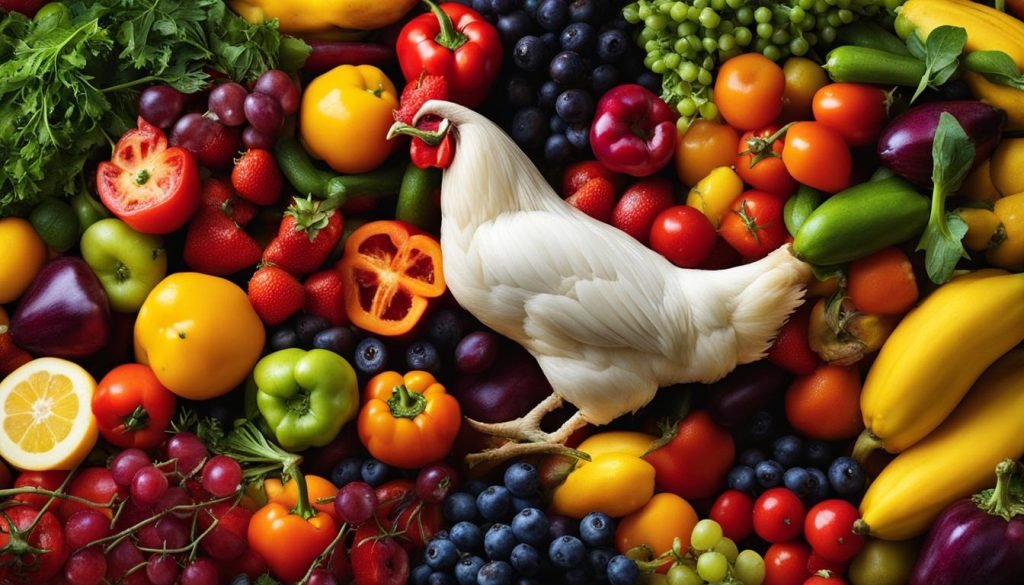
Key Takeaways:
- Understanding the dietary needs of chickens is crucial for their overall health.
- A balanced diet for chickens includes essential nutrients such as proteins, carbohydrates, fats, vitamins, and minerals.
- Commercial chicken feeds are a convenient and effective option for ensuring your chickens receive a proper diet.
- Alternative feeding options such as homemade feeds, kitchen scraps, and foraging can also be beneficial if done correctly.
- Monitoring your chickens’ health and behavior is essential for identifying any nutritional deficiencies or imbalances in their diet.
The Basics of Chicken Nutrition
As a chicken owner, it is essential to understand the basics of chicken nutrition to provide your feathered friends with a healthy and balanced diet. Chickens require a variety of nutrients to maintain optimal health and productivity.
The Essential Nutrients for Chickens
Chickens require six essential nutrients in their diet:
- Proteins: Chickens need protein for growth, development, and tissue repair. Good sources of protein include soybean meal, fish meal, and meat and bone meal.
- Carbohydrates: Carbohydrates are a primary energy source for chickens. They are found in grains like corn, wheat, and barley.
- Fats: Fats are essential for energy, insulation, and nutrient absorption. Good sources of fat include vegetable oil and animal fats.
- Vitamins: Chickens need a range of vitamins, including A, D, E, K, and the B vitamins. Vitamins help with metabolism, immunity, and bone development.
- Minerals: Chickens require a range of minerals, including calcium, phosphorus, and potassium, for healthy bone development, eggshell quality, and muscle and nerve function.
- Water: Water is essential for all bodily functions, including digestion, nutrient absorption, and waste removal. Chickens should always have access to fresh, clean water.
Feeding your chickens a balanced diet that includes these essential nutrients will help ensure their optimal health and productivity.
Creating a Chicken Feeding Guide
Creating a feeding guide for your chickens will help you provide them with a balanced diet. A feeding guide should include:
- The types of feed you will offer, including commercial feed and alternative options like kitchen scraps and foraging.
- The amount of feed to provide is based on the age, weight, and activity level of your chickens.
- The frequency of feeding can vary depending on the age and needs of your chickens.
- The inclusion of supplements such as grit, oyster shells, and probiotics ensures your chickens receive the necessary nutrients.
Consulting with a veterinarian or poultry nutritionist can help you create a feeding guide tailored to your chicken’s specific needs.
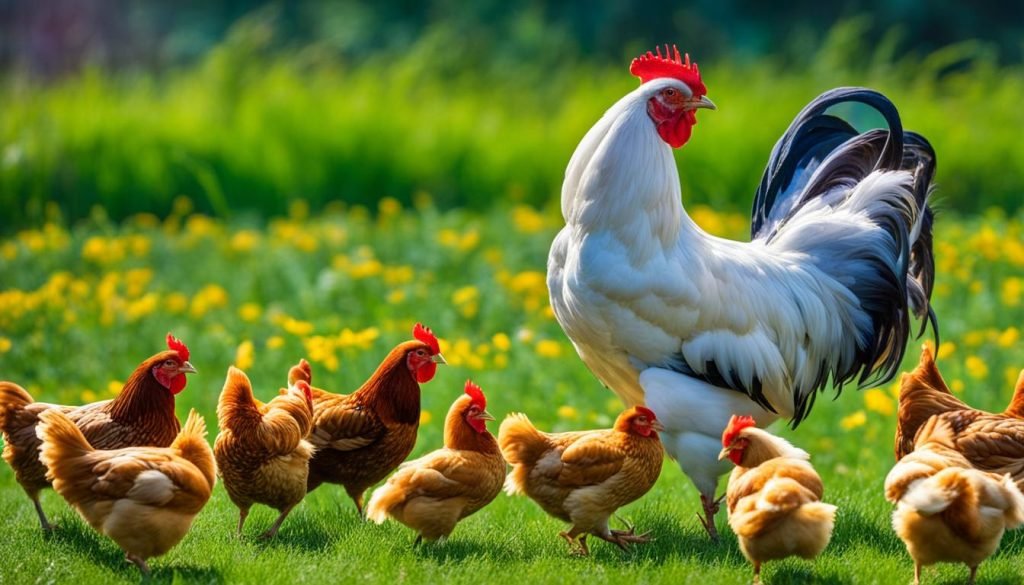
Tip: It is important to monitor your chickens’ behavior and health to ensure they are receiving adequate nutrition. Signs of nutritional deficiencies include poor feather quality, low egg production, and reduced activity levels. Talk to your vet if you suspect your chickens may be experiencing a nutritional imbalance.
Feeding Your Chickens: A Guide to Healthy Options
Feeding chickens a healthy and balanced diet is essential to ensure their overall health and well-being. As a backyard chicken keeper or a commercial farmer, it’s important to understand the different options for feeding chickens and how to provide them with a proper diet.
There are a variety of options for feeding chickens a healthy diet. One of the most popular and convenient options is commercial chicken feed, which is formulated to provide all the essential nutrients that chickens need. There are different types of chicken feed available, including starter feed for young chickens, layer feed for hens that are laying eggs, and broiler feed for meat birds.
Homemade Chicken Feed
In addition to commercial chicken feed, you can also make your own homemade feed using ingredients from your garden or local feed store. This is a great option if you want to have more control over what your chickens are eating or if you want to save money on feed costs.
When making homemade chicken feed, it’s important to ensure that the feed is nutritionally balanced and contains all the necessary nutrients. A typical homemade chicken feed recipe might include grains like corn, wheat, and oats, as well as protein sources like soybean meal and dried peas. Be sure to research the proper ratios and nutrient requirements before making your own feed.
Kitchen Scraps and Foraging
Another option for feeding chickens a healthy diet is to supplement their feed with kitchen scraps and allow them to forage for insects and plants in your yard. Chickens are natural foragers and enjoy pecking and scratching for their food.
When supplementing with kitchen scraps, it’s important to avoid feeding chickens foods that are unhealthy or potentially harmful. Some foods that are safe and nutritious for chickens include fruits, vegetables, and grains. Avoid feeding them processed foods, salty snacks, or anything that contains caffeine or chocolate.
Portion Control and Frequency of Feeding
When feeding chickens, it’s important to provide them with the right amount of food at the right times. Overfeeding can lead to health problems like obesity, egg-laying issues, and digestive problems.
As a general rule, chickens should be fed about 1/4 to 1/3 pound of feed per day, depending on their size and activity level. You can divide this into two or three small meals throughout the day. Make sure to remove any leftover feed from the coop to prevent spoilage and attract pests.
The Role of Supplements in Chicken Diets
Feeding chickens a balanced diet is essential for their overall health, but sometimes commercial feeds alone may not provide all the necessary nutrients. This is where supplements can play a vital role in ensuring proper chicken nutrition.
One common supplement for chickens is grit, which they need to grind and digest their food properly. Grit comes in two forms: insoluble and soluble. Insoluble grit is made of small, hard stones and helps grind food in the gizzard. Soluble grit, on the other hand, is made of crushed oyster shells and is a good source of calcium. It aids in the formation of eggshells and overall bone health, particularly in laying hens.
The Importance of Oyster Shell
As previously mentioned, oyster shell is an important supplement for laying hens. Laying hens require a high level of calcium to produce strong eggshells, and oyster shell provides this essential nutrient. It’s recommended to mix oyster shell into your chicken’s feed or provide it in a separate feeder for them to consume as needed.
The Benefits of Probiotics
Probiotics, or beneficial bacteria, can be added to chicken diets to aid in digestion and improve overall health. Probiotics can help prevent harmful bacteria from colonizing the gut, leading to better gut health and increased nutrient absorption. Some farmers even claim that feeding probiotics to chickens can lead to increased egg production.
Water: A Vital Supplement
While not technically a supplement, clean, fresh water is essential for chickens’ health and survival. Chickens need access to water at all times, and water should be changed daily to prevent the growth of harmful bacteria. Additionally, providing clean water can help prevent chickens from drinking from contaminated sources, which can lead to illness.
The Risks of Feeding Chickens Certain Foods
While supplements can be beneficial, it’s important to be aware of the potential risks of feeding chickens certain foods. For example, feeding chickens too much scratch grains can lead to nutritional imbalances and obesity. Additionally, certain foods such as avocado and chocolate can be toxic to chickens and should be avoided.
In conclusion, supplements can play an important role in ensuring optimal chicken nutrition. Grit, oyster shell, probiotics, and fresh water are all supplements that can provide essential nutrients and improve chicken health. However, it’s important to be aware of the potential risks of feeding chickens certain foods and to provide a balanced and varied diet to ensure their overall well-being.
Best Practices for a Balanced Chicken Diet
Creating a balanced diet plan for your chickens is crucial for their overall health and well-being. Here are some practical tips to help ensure your feathered friends are getting the best food for chickens:
Offer a Variety of Foods
Chickens, just like humans, need a variety of foods to maintain a healthy diet. Make sure to offer a mix of commercial chicken feed and alternative options such as kitchen scraps, fruits, and vegetables. This will help ensure that your chickens are getting all the essential nutrients they need through their diet.
Maintain Cleanliness and Hygiene in the Feeding Area
Keeping your chicken’s feeding area clean and hygienic is crucial for preventing the spread of disease and parasites. Make sure to clean their feeding and watering equipment regularly and keep their food and water sources off the ground to avoid contamination.
Monitor Your Chickens’ Health and Behavior
Keep a close eye on your chickens’ health and behavior to detect any signs of nutritional deficiencies or imbalances. For example, if you notice that your chickens are losing feathers or experiencing slowed egg production, it may be a sign of protein deficiency. Adjusting their diet accordingly can help prevent future health issues.
Follow a Chicken Diet Plan
Creating a balanced chicken diet plan is one of the best ways to ensure that your feathered friends are getting the best food for chickens. Consult with a veterinarian or poultry nutritionist to create a diet plan tailored to your chickens’ specific needs and requirements.
By following these best practices for a balanced chicken diet, you can help ensure your chickens are happy and healthy, and continue to provide you with fresh, delicious eggs for years to come.
More About Chickens:
- How Do Chicken Mate? Reproduction Explained
- How Long Do Chicken Live?
- 15 Facts About Chicken People Don’t Know
- Chicken Quiz: How Well Do You Know Chicken?
Frequently Asked Questions
What do chickens eat?
Chickens have a varied diet that consists of grains, seeds, vegetables, fruits, insects, and even small animals. They require a balanced diet to meet their nutritional needs and maintain good health.
What is the best food for chickens?
The best food for chickens is a combination of commercial chicken feeds and supplemental sources such as kitchen scraps, foraging, and homemade feeds. Commercial chicken feeds provide a balanced mix of nutrients, while supplemental sources offer variety and natural foraging behavior.
How do I create a proper diet plan for my chickens?
To create a proper diet plan for your chickens, it’s important to offer a mix of commercial chicken feeds, fresh vegetables and fruits, grains, kitchen scraps, and access to forage. Ensure that the food is well-balanced and provides essential nutrients for their health and well-being.
Do chickens need supplements in their diets?
Yes, supplements play an important role in chicken diets. Common supplements include grit, oyster shell, and probiotics. Grit helps chickens grind their food, oyster shell provides calcium for strong eggshells, and probiotics support the gut health of the chickens.
How often should I feed my chickens?
Chickens should have access to food and fresh water at all times. Provide them with regular meals of a balanced diet while monitoring their intake to avoid overfeeding or underfeeding.
Can chickens eat kitchen scraps?
Yes, chickens can eat kitchen scraps as long as they are safe and appropriate for their consumption. Avoid feeding them foods that are toxic to chickens, such as avocado, chocolate, or onions.
How do I ensure my chickens have a balanced diet?
To ensure your chickens have a balanced diet, offer them a variety of foods including commercial feeds, fresh vegetables, fruits, grains, and insects. Monitor their health and behavior for any signs of nutritional deficiencies or imbalances and make adjustments to their diet accordingly.

